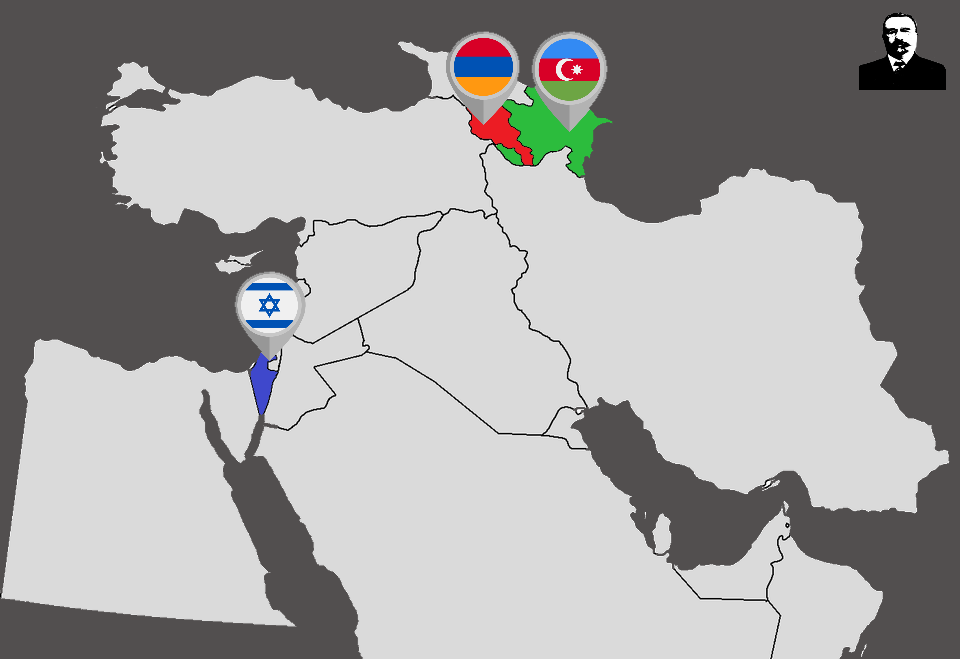Armenia-Azerbaijan conflict: where does Israel stand?

The South Caucasus witnessed another military escalation in mid-July. Following an Armenian provocation against Azerbaijan on July 12, the two nations engaged in fierce battles that resulted in at least 17 deaths, including a civilian from the Azerbaijani side.
Despite being usually referred to as a ‘frozen conflict,’ the Armenian-Azerbaijani confrontation is in fact, very hot and active. Remarkably, the ongoing skirmishes broke out not in the usual hotbed, Nagorno-Karabakh, which is Azerbaijan`s internationally recognized territory currently under Armenia`s occupation, but along the uncontested state border (see Map 1). Although several reasons have been examined to understand the possible motivations for the flare-up, it did not escape the attention of the expert community that Tovuz, the focal region for the current clashes, borders also Georgia: this is the very province which several key infrastructures go through: namely the Baku-Tbilisi-Ceyhan (BTC) oil pipeline, the Baku-Tbilisi-Erzurum (BTE) gas pipeline and the Baku-Tbilisi-Kars (BTK) railway, all extending from Azerbaijan to Turkey via Georgia.
Map 1. Azerbaijan and Armenia: Nagorno-Karabakh and the main theater (Tovuz) of the current skirmishes
This specific infrastructure, crucial for energy security of Southern and South-Eastern Europe, also holds special importance for Israel, too: the latter is one of the main importers of Azerbaijani oil via the afore-mentioned Baku-Tbilisi-Ceyhan pipeline. Approximately 40 percent (according to some other estimates, as high as 65 percent) of Israel's total oil imports come from Azerbaijan. Therefore, any provocations near and/or against the BTC pipeline pose a real threat to Israel`s energy security as well.
When the previous clashes between Armenian and Azerbaijani forces broke out in April 2016, the Azerbaijani military liberated a piece of territory from Armenian occupation, by effectively utilizing several types of drones, mostly Israeli-made. The April war in fact served as a successful display of the Azerbaijani-Israeli military-industrial partnership. This partnership, initiated in 2009, has been only growing to the level that within only ten years has Azerbaijani become the second largest customer of the Israeli military industry (17%) after India. Working with Israel's defense industry companies Elbit, IAI MALAT and RAFAEL (formerly ADS), Azerbaijan put more emphasis on Unmanned Aerial Vehicles (UAVs). As a result, the acquisition of modern Israeli UAVs has significantly increased Azerbaijan's military-technical superiority over Armenia.
The recent border skirmishes (July 12-16) also featured the extensive use of drones from the Azerbaijani side. Interestingly enough, on each day of fighting both Armenian official sources and unofficial militarist news sites close to the Armenian army boasted - or tried to boast - by spreading misinformation about shootdown of Azerbaijan`s Israeli-made UAVs. Overall, the authorities in Yerevan claim to have shot down and captured 13 drones of the types Orbiter 3, Orbiter 2, SkyStriker, and Harop. Among them, according to the Armenian defense ministry, is also the Elbit Hermes 900, one of the world`s most state-of-the-art UAVs. The seriousness of the official claims was, nevertheless, challenged several times as the relevant visual report happened to be false (see Photo 1). In fact, German military analyst Julian Röpcke, too, proved the inaccuracies of the alleged Armenian video of the shootdown. Most importantly, the absence of the remains of the allegedly shot down Hermes 900 casts a shadow over the Armenian claims.
In any way, the relevant claims pushed an interesting trend in Armenia, which we coined ‘drone patriotism’ or ‘drone nationalism.’ The news that "elite UAVs of Israeli origin were shot down by the Armenian army for the first time" has become a source of national pride in the Armenian society and serves to discredit the myth of the invincibility of Israeli drones, as many Armenian citizens have shared it on social media.
Photo 1. To further increase the ‘drone patriotism’ in the society, Armenian official agencies presented the images of an UAV shot in Afghanistan as an Israeli-manufactured Azerbaijani drone
As the Azerbaijani UAVs` Israeli origin is emphasized almost in all Armenian reports, another effect of drone patriotism is to deepen anti-Semitism in Armenia. According to the 2014 ADL statistics, Armenia's anti-Semitism index (58%) is even worse than that of Iran (56%). Another study, by Pew Research Center, dated March 2018, also revealed Armenia as the most anti-Semitic nation in Eastern Europe. There is no doubt that these statistics will be worsened by the misleading of the public with fake news and the so-called drone patriotism.
The anti-Semitic mood in Armenia, the most ethnically homogenic country in Europe, contradicts the multicultural atmosphere in Azerbaijan, a Muslim country, which is home to an ancient Jewish community. Once known as “Little Jerusalem”, Qırmızı Qəsəbə or Red Town in English, a small settlement in northeastern Azerbaijan is inhabited by nearly 4,000 Mountain Jews. Although a big portion of the local Jews were decimated alongside the Azerbaijanis by the Armenian gangs in 1918, the community managed to survive until the present time. Having emigrated mostly to Russia, the United States and Israel in the early 1990s, the Mountain Jews outside Azerbaijan, nevertheless, keep their affiliation with their homeland and contribute to Azerbaijani-Jewish friendship. The Azerbaijani parliament usually has at least one Jewish member (the present Jewish parliamentarian is Anatoly Rafailov), while a Baku-born Yosef Shagal served as a member of the Knesset and later as Israeli ambassador to Belarus.
When the July skirmishes broke out after Armenia`s aggressive actions against Azerbaijan, Azerbaijani Jews also supported their motherland. For instance, several Azerbaijani-born and Russian-based Jewish businesspeople, God Nisanov, Zarakh Iliev and Aras Agalarov, joined the boycott campaign against the Armenian goods, as their businesses refused to trade with Armenian entrepreneurs. Emin Agalarov, Azerbaijani-Russian singer and businessman, and Khayyam Nisanov, Azerbaijani singer, both of Jewish origin, also voiced their moral support to the Azerbaijani people during the border clashes.
In contrast to the constantly and positively developing Israeli-Azerbaijani relations, the Armenian state has established a very broad alliance with Israel's archenemies: Armenia relies on and regularly receives necessary aid from Iran and remains an ardent supporter of Bashar al-Assad since the outbreak of the Syrian conflict. Armenia`s Prime Minister Nikol Pashinyan sent troops to Syria last year at the insistence of Russia, Armenia`s military ally. The Armenian businesses have also actively backed Iran's activities in Syria. For example, in January 2019, the United States imposed sanctions on Armenia's Flight Travel LLC and its CEO Bella Gevorgyan for cooperating with Mahan Air, which carries arms from Iran to Syria and establishing indirect ties with Islamic Revolutionary Guard Corps-Qods Force (IRGC-QF).
A recent article by an Armenian author explains why the long-discussed Armenian embassy in Israel would be a pointless idea: the Haredim dislike and insult Jerusalem Armenians; the opening of the embassy would hurt Armenia’s vital relations with Iran; the Jewish lobby in Washington prevents the official U.S. recognition of the 1915 events, etc.
The Armenia-Azerbaijan conflict has long gone beyond the South Caucasus and involves numerous international actors. Israel (as well as some Jews), too, takes part, albeit indirectly, in and may be affected by the flare-up in this neighborhood. But Israel would hopefully support a morally just and geopolitically correct position in the region.







